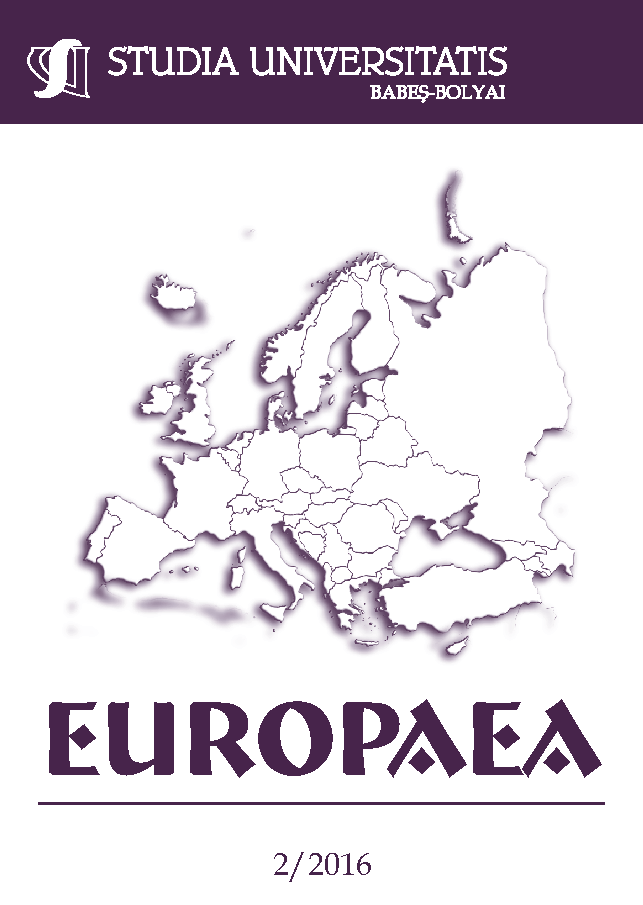NOTES ON THE POLITICAL CULTURE IN ROMANIA / ANMERKUNGEN ZUR POLITISCHEN KULTUR IN RUMÄNIEN
Keywords:
political culture, secularization, civil society, political mythology, uncertainty, totalitarianismAbstract
This article focuses on the roots of political culture in Romania, beginning with the consolidation of the independent state, continuing through the experience of totalitarianism and the transformation process after the fall of comunism. Many of the political dificulties of Romanian society today can be traced back to specific experiences (or missing experiences) in the recent history. The lack of trust in political institutions and in the state, the underdeveloped civil society, the power of the church and the generalized corruption all find their explanation in specific structural settings of the past, from imported constitutions, through partial secularization, political myths and strong networks of former communist leaders. The only hope for the political recovery of the country is the strong presence of the EU, with its regulatory function.
References
Baconschi, Teodor (2015), Facebook. Fabrica de Narcisism, Bucuresti.
Badescu, Gabriel/Sum, Paul E. (2005), “Historical legacies, social capital and civil society: Comparing Romania on Regional level”, in Europe-Asia Studies, V. 57, 2005, S. 117-133.
Barbu, Daniel (2009), Die abwesende Republik, Berlin.
Barthes, Roland (1984), Michelet, Frankfurt a.M.
Berger, Peter L.; Luckmann, Thomas (2004),Die gesellschaftliche Konstruktion der Wirklichkeit: Eine Theorie der Wissenssoziologie, Frankfurt a.M.
Bogdan, Henri (1990), Histoire des pays de l'Est. Des origines a nos jours, Paris.
Bohle, Dorothee/Gerskovits, Bela (2012), Capitalist Diversity on Europe's Periphery, London.
Boia, Lucian: Geschichte und Mythos (2003), Über die Gegenwart des Vergangenen in der rumänischen Gesellschaft, Koln: Weimar.
Bolz, Norbert (2007), Das ABC der Medien, München.
Brandt, Sigried (1993), Religiöses Handeln in moderner Welt: Talcott Parsons Religionssoziologie im Rahmen einer allgemeinen Handlungs- und Systemtheorie, Frankfurt a.M.
Castoriadis, Cornelius (1997), Gesellschaft als immaginäre Institution, Frankfurt a.M.
Cesereanu, Ruxandra (2003), Imaginarul violent al Romanilor, Bucuresti.
Gabanyi, Anneli Ute (2004), „Die rumänischen Eliten in der Systemtransformation“, in Hans-Joachim Veen (Hrsg), Alte Eliten in jungen Demokratien?, Köln 2004, S. 313-333.
Gebhardt, Jürgen (2013), „Das religiös-kulturelle Dispositiv der modernen Politik“, in Hans Vorländer(Hg), Demokratie und Transzendenz, Bielefeld, S. 41-78.
Gillet, Olivier(1997), Religion et Nationalisme, Paris.
Habermas,Jürgen (1990), Strukturwandel der Öffentlichkeit, Frankfurt a.M.
Haltern,Ullrich (2009), Obamas politischer Körper, Berlin.
Hoppe, Louisa (2014), Die Kunst des Protestes. Die save-Rosia-Montana Kampagnie und ihre Bedeutumg für die zivilgesellschaftliche Protestkultur in Rumänien, Chemnitz.
Kantorowicz, Ernst (1991), Die zwei Körper des Königs, Frankfurt a.M.
Kedourie, Eli (1970), Nationalismus, München.
Kitromilides, Paschalis (2010), „The Orthodox in Modern Formation in South-East Europe“ In Alina Mungiu-Pippidi und Wim van Meurs (Eds), Ottomans into Europeans: State and Institution-building in South-Eastern Europe, London: Hurst; Boulder: Columbia University Press London, S. 31-51.
Klein, Ansgar (2001), Der Diskurs der Zivilgesellschaft.Politische Hintergründe und demokratietheoretische Folgerungen, Wiesbaden.
Lipset, Seymour; Stein Rokkan (1967), Party systems and voter alignments: cross national perspectives, New York.
Mungiu-Pipidi, Alina a. Van Neurs, Wim(Eds), Ottomans into Europeans. State and Institution Building in South-East Europe, London 2010:
Mungiu-Pipidi, Alina; Althabe, Gerard (2004), Villages Roumains. Entre destruction communiste e violence liberal, Paris.
Petrescu, Cezar (1993), Cei trei regi, Bucuresti: Fundatia Culturala Regala.
Rognean, Raul (2011), Die Beziehung von Kirche und Staat. Einbeziehungsmöglichkeiten der Orthodoxien, Cluj-Napoca.
Rohe, Karl (2003), „Politische Kultur und ihre Analyse“, in Andreas Dornheim, Sylvia Greiffenhagen (Hrsg.), Identität und politische Kultur, Stuttgart.
Roth, Andrei (2004), „Die rumänische ökonomische Elite-Kontinuität und Wandel“, in Hans-Joachim Veen (Hrsg.), Alte Eliten in jungen Demokratien?, Köln.
Roth, Andrei (1999), Democratia sau Nationalism, Tirgu Mures.
Roth, Andrei (2003), „Die Einheit der rumänischen Machtelite“, in Stephan Beetz/ Jacob Ulf/ Anton Sterbling (Hrsg.), Soziologie über die Grenzen. Europäische Perspektiven, Hanburg.
Roth, Andrei (1997), „Staatliche Bürokratie und neue Eliten im posttotalitären Rumänien“ in Anton Sterbling/ Heinz Zipprian (Hrsg.), Max Weber und Osteuropa, Hamburg.
Ryklin, Mihail/Uffelmann, Dirk (2008), Kommunismus als Religion, Frankfurt a.M.
Streek, Wolfgang (2013), Gekaufte Zeit. Die vertagte Krise des demokratischen Kapitalismus, Bonn.
Taylor, Charles (1992), Bedeutungstheorien, in Ders. Frankfurt a.M.: Negative Freiheit., S. 52-117.
Ther, Philip (2014), Die neue Ordnung auf dem alten Kontinent. Eine Geschichte des neoliberalen Europa, Berlin.
Valcu-Mehedinti, Mircea (Hrsg.) (2010), Alexandru D. Xenopol, Bucuresti.
Verdery, Katherine (1991), National Ideology under Socialism: Identitty and cultural Politics in Ceausescus Romania, Berkeley.
Verdery, Katherine (1999), The political Lives of dead Bodies, New York.
Verdery, Katherine (1999), Socialismul. Ce a fost si ce urmeaza, Bucharesti.
Voegelin, Eric (2004), Die neue Wissenschaft der Politik , München.
Weber, Max (1988), Gesammelte Aufsätze zur Wissenschaftslehre, Tübingen.
Zach, Krista u. Zach, Cornelius Z. (2004), Modernisierung auf Raten, München.
Downloads
Published
How to Cite
Issue
Section
License
Copyright (c) 2016 Studia Universitatis Babeș-Bolyai Europaea

This work is licensed under a Creative Commons Attribution-NonCommercial-NoDerivatives 4.0 International License.






